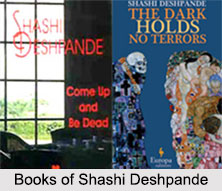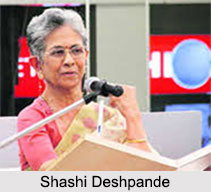 Born in the year 1938 in Dharwad, Karnataka, Shashi Desphande is the second daughter of the renowned Kannada dramatist and Sanskrit scholar, Shriranga. At the age of 15, she graduated in Economics from Mumbai and then moved to Bengaluru to complete her Law degree. After she got married, she pursued a course in journalism from a college in Mumbai and went on to work for the Onlooker magazine as a journalist for a couple of months.
Born in the year 1938 in Dharwad, Karnataka, Shashi Desphande is the second daughter of the renowned Kannada dramatist and Sanskrit scholar, Shriranga. At the age of 15, she graduated in Economics from Mumbai and then moved to Bengaluru to complete her Law degree. After she got married, she pursued a course in journalism from a college in Mumbai and went on to work for the Onlooker magazine as a journalist for a couple of months.
Early Life of Shashi Deshpande
Shashi Deshpande started her literary career in England by writing short pieces on her stay there and later moved on to writing short stories which were published in Indian magazines.
Her writing career took off in the year 1970 when she started with short stories which later developed into novels. Her first collection of short stories called The Legacy was published in 1978 and is not only famous in India but is also a part of the syllabi for the graduate students of the Columbia University. Since her first publication of short stories, she brought out four other collection of short stories, wrote a total of 8 novels and 4 children"s books. Her works has been translated into various Indian and European languages. Shashi Deshpande is regarded as one of the most accomplished contemporary Indian women writers in English.
Works of Shashi Deshpande
Shashi Deshpande"s works have always emphasized this country in such a way where the lives of the people are presented as it is and not as it should be. In her works, she presents a plausible story of authentic characters and not shadowy abstractions. Women play pivotal roles in her novels, they depict the anguish and concern of the modern Indian woman caught between patriarchy and tradition on one hand, and self expression, individuality and independence for the women on the other hand.
The heroines in her works are sensitive to the changing times and situations, they revolt against the traditions in their search for freedom. They succeed in achieving self-identity and independence and choose their partners in life to live within pursuance of their need to lead a family life. They establish the role that they play in the family - a daughter, a wife, a mother and also a career woman. Standing at cross-roads of tradition they do seek a change, but within the cultural norms so as to enable themselves to live with dignity and self-respect. Listed below are few of Shashi Despande"s works:
The Dark Holds No Terror: Her first novel, The Dark Holds No Terror was written in 1980. The story starts with the death of Dhruva, the 7 year old brother of the protagonist, Saru, who was blamed by her own mother for the untimely loss of her son. Death and bereavement have always been a major part of Deshpande"s works. The novel explores the myth of man"s unquestionable superiority and the woman being a martyr and a paragon of virtues. The novel does a powerful portrayal of one woman`s fight to survive in a world that offers no easy outs. The story line is mainly on the waking up to the releasing knowledge that there is more to life than dependency on one"s husband or parents and social acceptance. That the women are self-sufficient in all aspects and in this story the protagonist is in the process of searching that.
Roots and Shadows: The novel "Roots and Shadows" won the author the Thirumathi Rangammal Prize for the best novel written and published in India for the year 1982-83. The novel deals with the endorsement of patriarchal structure where Indu, the protagonist is an educated young woman, who brushes aside all the age-old beliefs and superstition. Despite the insidious conflict between tradition and modernity, Indu"s acceptance of the western values and her constant search for freedom was preconditioned with an unfettered growth and maturity of personality. Ultimately this resulted in her emergence as an evolved woman with determination to not yield to the dictates of the patriarchal society.
 That Long Silence: One of the most praised novels by Shashi Deshpande, the book That Long Silence won the Sahitya Academy Award in 1990 and the Padma Shri in 2014. This was the first novel of Shashi where the themes of alienation and isolation, with that urge to revolt to break apart from that long silence is stated. Jaya, the lead protagonist of the story presents the readers with a new image of the Indian woman who tries to assert her individuality and seeks to break the age-old silence by refusing to always blindly listen to her husband. In this simple story, there lies the grand swell of frustration; a loveless married life is compared with the help of a beautiful imagery as Jaya says: "A pair of bullocks yoked together-but the reality was only this. We were only two persons. A man and a woman." The novel also has an underlying theme of existentialism like all other Deshpande"s works, where there is the sufferance of the human mind and grappling with the experience of the lonely and anguished man.
That Long Silence: One of the most praised novels by Shashi Deshpande, the book That Long Silence won the Sahitya Academy Award in 1990 and the Padma Shri in 2014. This was the first novel of Shashi where the themes of alienation and isolation, with that urge to revolt to break apart from that long silence is stated. Jaya, the lead protagonist of the story presents the readers with a new image of the Indian woman who tries to assert her individuality and seeks to break the age-old silence by refusing to always blindly listen to her husband. In this simple story, there lies the grand swell of frustration; a loveless married life is compared with the help of a beautiful imagery as Jaya says: "A pair of bullocks yoked together-but the reality was only this. We were only two persons. A man and a woman." The novel also has an underlying theme of existentialism like all other Deshpande"s works, where there is the sufferance of the human mind and grappling with the experience of the lonely and anguished man.
If I Die Today: Subtly depicting the problems of the patriarchal society, the novel is a crime fiction set in the medical premises. The plot revolves around a murder and thus the novel is around that while discussing the intricacies of the human relationships. Shashi Deshpande weaves this story not just as a crime fiction, but as a story about the criminal mind of a human and what goes on behind it and how people who are not even part of the crime get forcefully involved. In the end, though the readers know who the real culprit is but they never get to know the real motive behind it.
Come Up and Be Dead: The novel is a psychological thriller demonstrating the versatile award winning literary skills of Shashi Deshpande. The story deals with the suicide of a schoolgirl in an elite school. The Head Mistress is unable to deal with the situation and especially when it is followed by rumours pointing at her brother. Two more deaths follow, making the school a place of fear and suspicion. After an attempted murder, Devayani, the Head Mistress, cousin and housekeeper, suspects a conspiracy behind it all. The story is full of suspense with lots of variety in thoughts. The author made it interesting with wonderful storytelling. This is a unique attempt by Deshpande in English with deep human philosophy.
Shashi Deshpande"s other works include the likes of Strangers to Ourselves, A Matter of time, Small Remedies, The Binding Vine, etc. Her novel "The Shadow Play" was short-listed for The Hindu Literary Prize of 2014. She also wrote few children"s books namely "A Summer Adventure", "The Hidden Treasure", "The Only Witness" and "The Narayanpur Jacket". Apart from fiction, she has also written a number of articles on various subjects - literature, language, Indian writing in English, feminism and women`s writing - which have now been put together in a collection called the `Writing from the Margin.` She has been invited to participate in various literary conferences and festivals, as well as to lecture in universities, both in India and abroad.
Recently, on October 9, 2015, she resigned from her position on the Sahitya Akademi`s general council and returned her Sahitya Akademi award. In doing so, she joined a broader protest by other writers against the Akademi`s perceived inaction and silence on the murder of M.M. Kalburgi.



















